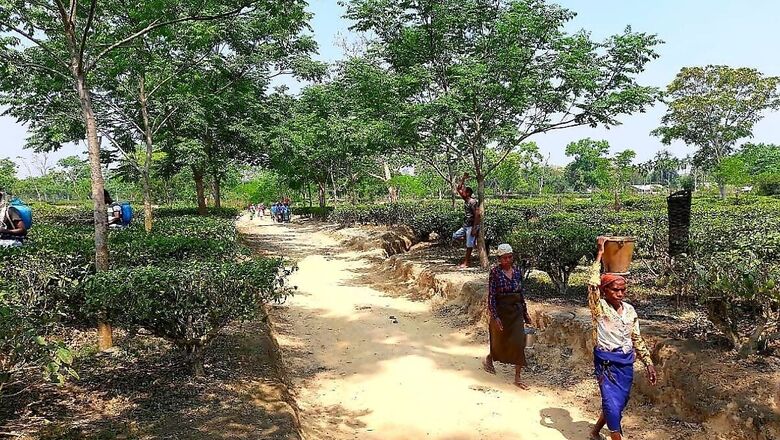
views
The state of Mokrong Tea Estate in Assam’s Golaghat district has turned alarming. Owned by the prestigious B&A Limited, most of its garden’s tea bushes which were pruned by the end of 2020, have not recovered. The otherwise lush green bushes are now wilting at an alarming rate. This is a clear indication of severe drought and an ominous future for the tea garden, which should have its most productive “First Flush” at this part of the year.
Bitu Tanti, factory executive of Mokrong Tea Estate said, there has been no rainfall in Assam. “Water is not reaching the roots of the bushes and as a result, the tea leaves are wilting. The bushes are dead and non-productive. We normally produce somewhere between 2000 to 2500 kilogram of green leaves a day. Now we are plucking around 250 to 300 kilos. This is next to nothing at all. The labourers pluck 12 to 18 kilos leaves individually, two days back they could pluck only three to four kilograms. Regarding irrigation, there is no water in the river flowing nearby. It is so dry that you can play football in it. Forget about getting the produce, we are not getting water to carry out irrigation in the gardens so that at least the bush survive.”
On Saturday, there are no tea leaves to be plucked in the Mokrong tea estate. On the same date in 2020, 1,410 kilograms of green tea leaves were yielded despite the Covid crisis.
“The garden has not received adequate rainfall this season. Given this aridity and dismal productivity, the garden workers had decided to take two-day leave on April 22 and 23 so that the bushes can regain and the management gets some respite. There are around 500 workers employed in Mokrong and the decision was unanimous,” Tanti said.
The industry which struggled with COVID restrictions incurred a deficit by 140 MKgs in 2020 and was hopeful of bounce back in 2021. Unfortunately, the rains played a spoilsport. Assam has harvested only 0.23 Mkgs during January-February 2021 as against 0.27 MKgs in 2020 and 0.44 Mkgs the year before. While the crop figure for the month of March is yet to be released by Tea Board, the figure is expected to be lower by around 10-15% in March and April 2021 compared to 2019.
The state’s Brahmaputra valley has received only 14.2 mm of rainfall during January-February 2021 as against 28.47 mm in 2020. Similarly, the Cachar region has received only 4.15 mm rainfall as against 8.3 mm last year.
Koomtai Tea Estate in Golaghat district of Upper Assam manufactured 84,876 kg of tea in 2019. In the lockdown year of 2020, it produced 10,896 kg. The drought situation this year has brought down the production sharply to 27,260 kg.
Sarabjeet Singh, Manager of Khoomtai Tea Estate explained, “There is a deficit rainfall in April by almost 400% this year. Last year we received 2.87 inches and this year it is just 0.65 inches. In April, plants require the maximum amount of water and any deficit in this month takes a toll on plant health and affects the season’s crop. The projected maximum temperature on coming Monday is 39 degree and the minimum is 17 degree. This is causing extensive evaporation which in turn is harming plants.”
During drought spell, rainfall significantly decreases below the average. Under the situation, the consumptive use of water by the tea bushes exceeds the rainfall. The minimum water in the soil is held with great tension rendering it unavailable to the plant. Water is retained in the soil with such a great tension at the wilting point that no water becomes available to the roots. As a result, the plant expresses its inability to maintain the turgidity of its cells. The earliest symptom of wilting becomes evident during the hottest part of the day with downward drooping of leaves and young shoots to various degrees depending on the severity of drought. During the hottest part of the day, transpiration loss by leaves may exceed the intake of water by roots and as a result, wilting symptoms become evident.
However, under temporary wilting, the wilting symptoms disappear at night time when the temperature falls and absorption of water by roots compensate the transportation loss. Under permanent wilting point, water in the cell is reduced to such a low level that it causes deformation of molecules and dedication of protoplasm.
“The tea industry again faces grim days ahead due to the drought resulting in the lesser crop. Unless there is an improvement in the weather, we apprehend that the production will be less by 10 to 15%. Around 10.5% of Assam’s total tea production — which was 618.35 million kilos last year — is recorded during March and April,” said Dipanjal Deka, Secretary Tea of Association of India, Assam chapter.
Low tea production in 2020 due to the Covid-19 lockdowns and restriction saw a good realization of Assam Tea in auctions. This, however, eased off by the end of the year. The lockdown also brought cheer to the small tea growers of Assam as the leaves were bought at a record price of Rs 45-55 per kilogram.
For tea blending entrepreneurs like Aromica Tea owner, Ranjit Baruah, branding Assam tea in 2020 was an experiment. Covid restrictions led him to come up with new blends for its immune-boosting and stress-relieving properties.
“During the Covid lockdown, we came up with the Moringa tulsi green tea, spiced turmeric green tea, tulsi ginger tea and the best-seller, the Fiery Bhut Jolokia tea. In fact, Bhut Jolokia tea saw the highest sale during the covid period last year. It helps to give relief from body aches, sore throat, feverish feeling, cough and cold and clogged nose. The bamboo shoot tea was also introduced during Covid times. Bamboo shoots contain phytochemicals and have anti-bacterial and anti-viral properties. It has formed an integral part of the diet of North East people for ages. In the end, Assam tea has proven itself to be a good source for building the immune.” Baruah said.
Baruah had other plans with Assam Tea this year as he introduced Camel Milk Tea and Bel Tea (Wood Apple Tea) until the recent second wave of COVID hit him hard. With the government orders to pull down shutters by 6 PM, tea business establishment like his finds it difficult to remain afloat.
“Last year, we struggled a lot. This time, I lack that zeal. Besides, this time the Covid wave is more worrisome. Better be safe first. Business shall come if we tide through,” Baruah said.
Read all the Latest News, Breaking News and Coronavirus News here. Follow us on Facebook, Twitter and Telegram.



















Comments
0 comment